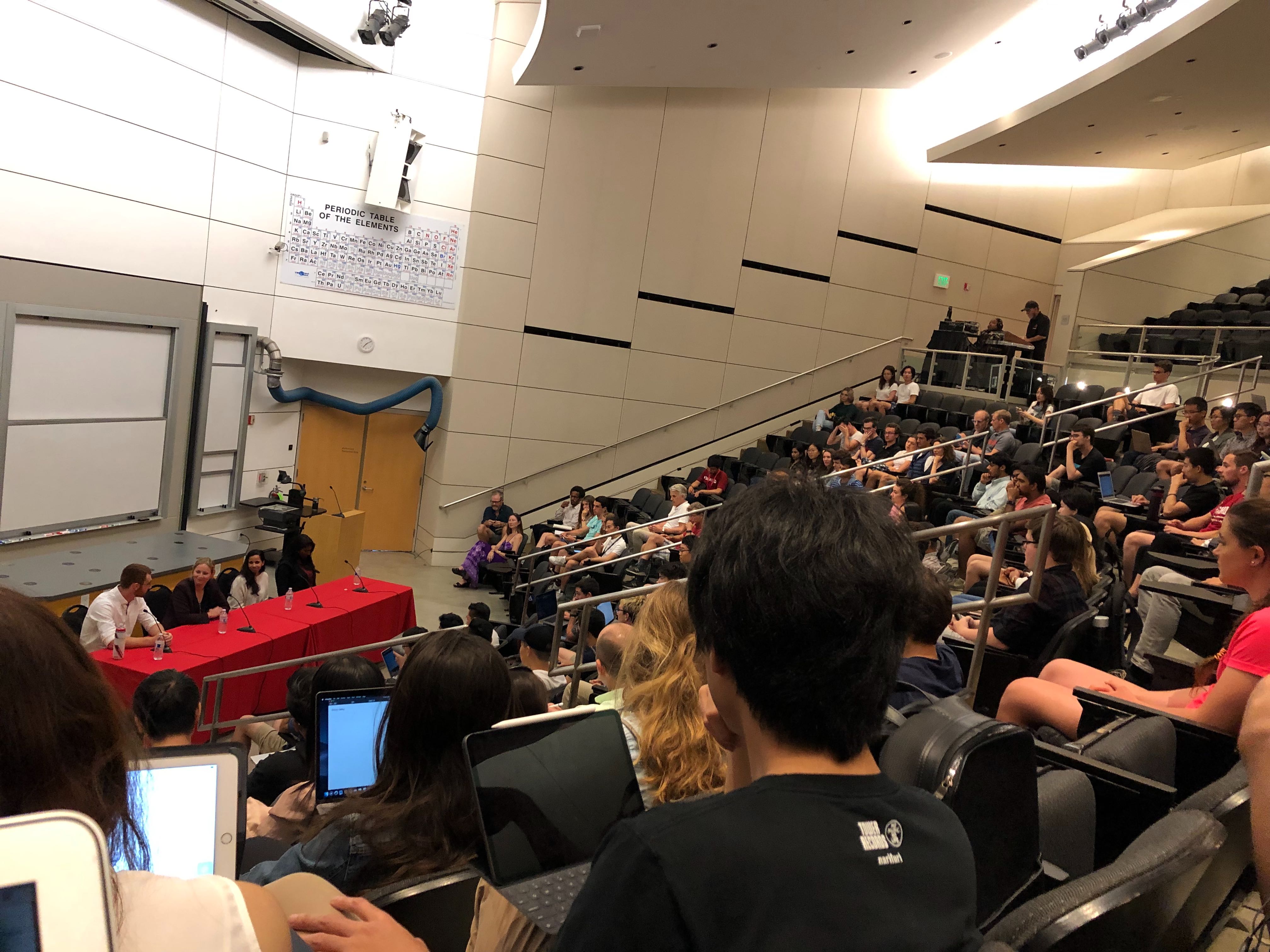Want to be successful in Silicon Valley? Focusing on the big picture and taking risks are key, according to three recent Stanford grads who shared their experiences with entrepreneurship as part of the four-person “Secrets of Silicon Valley” panel on July 25.
Mechanical engineering lecturer Bill Cockayne hosted the panel, in which Michael Tucker ’18 discussed his mechanical engineering role at the electric air-taxi startup Joby Aviation, while Louise Fleischer ’18 talked about running weather systems engineering at Zipline International Inc., a company that delivers medical supplies by drone. Santhi Analytis ’09 Ph.D. ’14 described her work as the CTO and co-founder of Moxxly, a startup that makes breast pump kits. Allyson Dias, who is not a Stanford alum but serves as director of the Thiel Fellowship program, also spoke on the panel.
Given the small market for air taxis and Joby Aviation’s small number of prototypes, the future of the startup is unpredictable, Tucker said. But he describes himself as someone driven to radical innovation and change. While he said there are risks inherent in the lack of a stable market for Joby’s products, the prospect of helping to shape the unknown thrills him.
“I’m very much exhilarated by the idea of possibly creating this new future,” Tucker said.
While taking MS&E 273: “Technology Venture Formation,” Fleischer had developed a similar idea of delivering medical supplies by drone. She realized she wanted to use drones in more meaningful ways than just for recreation or photography. After discovering Zipline, she joined the company because its services aligned closely with her vision.
“I need to be where the action is,” Fleischer said. “I need to feel like what I’m doing is actually useful, not to the individual but to the human species.”
When asked why students would take the risk of dropping out of school to accept the Thiel Fellowship — a two-year program that offers a $100,000 grant for students to skip out of college in order to pursue their own ideas — Dias said the Thiel Fellowship directors believe genius exists everywhere, and that what truly matters is each individual’s passion for innovating.
“We subscribe to the notion that one size doesn’t fit all … what we want to look for is when people have that desire to create something that doesn’t exist,” Dias said.
The panelists praised Silicon Valley, renowned as a center of innovation and home to numerous technology companies, for its meritocratic structure. Anyone with enough initiative and willingness to learn has the potential to break through and become an entrepreneur, Tucker said.
But panelists also pointed to problems in the Valley. A lack of attention to infrastructure, public education and affordable housing was cited by panelists as a key concern, but they brought up other, more intangible downsides as well.
Because Silicon Valley is so technology-focused, much of the “culture and magic of San Francisco has been lost, and the culture [in Silicon Valley] is homogeneous and stale,” Dias said.
“I think the homogeneity here is really troublesome,” Tucker added. “You can only talk about computer science so much until you get bored out of your mind.”
When asked about their educational backgrounds and how they got into Stanford, the three Stanford graduates agreed on the importance of telling a unique story in their applications.
“Personal statements are important, because admissions officers are looking for voice, and you can’t really fake that,” Analytis told the audience, which included many high schoolers.
Even though there are no guarantees, Tucker encouraged applicants to “take advantage of the opportunities [they] have” because admissions officers evaluate applicants relative to the communities they are from, and they want to see more than someone simply going to class and getting a passing grade.
The panel was sponsored by the Silicon Valley Innovation Academy 2019 (SVIA19), which describes itself as an “exclusive opportunity for a limited number of Summer Session students to experience a team-based moonshot project while at Stanford.” The program accepts high school and college students and aims to develop leadership and teamwork skills through “weekly, hands-on coaching sessions and real-world deliverables.”
SVIA hosted a well-received panel discussion on similar topics last year, said Tamara Carleton, executive director of SVIA. Carleton expressed hope that this year’s event would bring in fresh perspectives regarding entrepreneurship in Silicon Valley by introducing panelists from more diverse backgrounds.
Contact Alena Zeng at alenazeng ‘at’ gmail.com.
